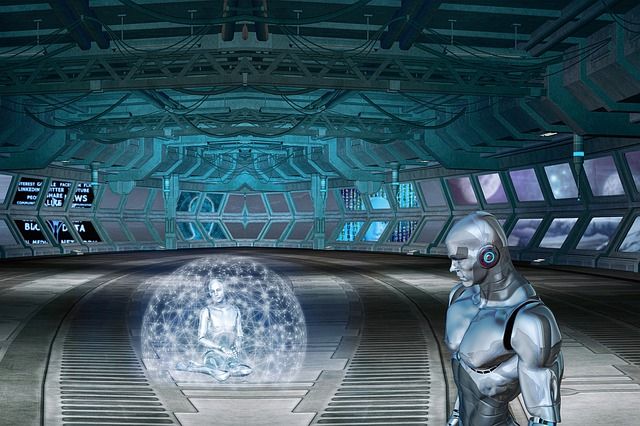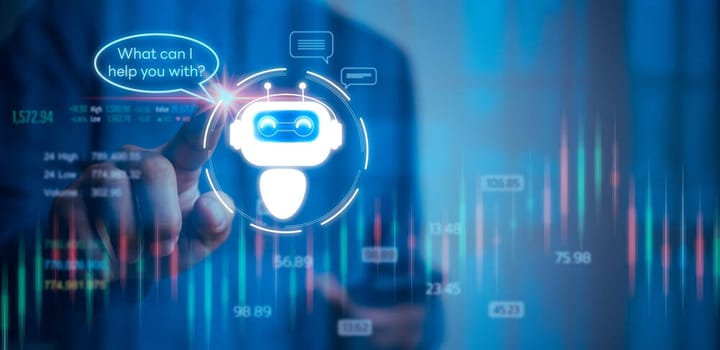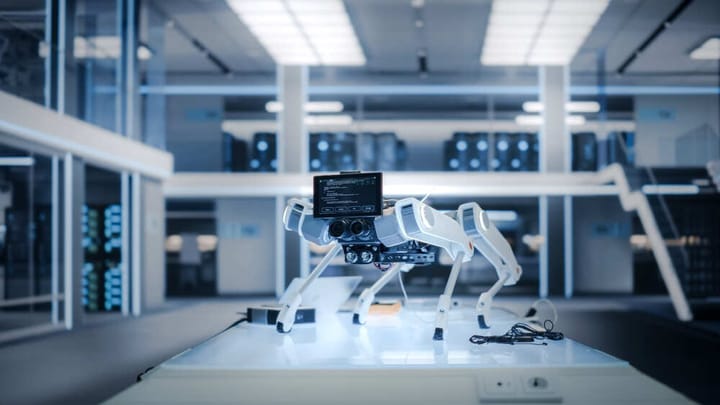Will Robots Ever Control The World?
Conceive an image in your mind that robots are ruling the world, they have mastered human beings and now humans are working as their slaves. All of this happened after a huge war of the human race against Robots in which the humans lost against them.

From ancient stories of stone golems to sci-fi movies, robots have spellbound human minds for epochs. A robot is an automatically operated machine that may have a humanoid/animal appearance or not and is programmed to perform specialized tasks.
The Evolution of Robots and Robotics
Early Robotics
Egyptian Water Clock is one of the most primitive inventions of robotics, developed in 1500 BCE. The remarkable thing about this invention was not the use of water to tell time but it was the water force in the clock striking the bells on the hour with the help of human figurines. In 400 B.C., a Greek mathematician Archytas invented a wooden flying pigeon- a mechanical bird propelled by steam. Leonardo Da Vinci was another notable mind in the field of Engineering. In 1495, he designed and manufactured what we now call the “Robot Knight”. This robot not just could sit and stand but also move its arms with the help of pulleys and cables.
The Advancement in Automation
Modern automation was evolved in the 17th century when a French inventor Jacques de Vaucanson invented three automata, among which the first two were capable of playing on the flute, tambourine, and drum while the third one was a duck that could flap its wings, quack, move and even eat. In 1810, Friedrich Kauffman from Germany designed a soldier look-like robot that could blow trumpets with the help of automatic bellows.
The Advancement in Mechanical Programming
The advancements in mechanical programming occurred in the 19th century when a general-purpose computer called an “Analytical Engine” was designed by a mathematician Charles Babbage. This engine served as the pioneer for the modern digital computer. In 1898, a remote-controlled wireless torpedo was designed and built by Nikola Tesla, who called this process of the robotic torpedo “Tele-automation”.
Though robotics was gradually progressing with time, the term “Robot” was not used by anyone until 1921 when Czech writer Karel Capek first coined the word “Robot” in his play R.U.R. (Rossum’s Universal Robots). In the play, the robots were factory-made humans who ultimately revolted and devastated humanity. The term “Robotics” got popularity in 1942 by the efforts of Isaac Asimov, whose robots captured the imagination of Post-War America after World Wars that initiated a new epoch in robotic history.
In 1946, the first electronic general-purpose computer called “ENIAC” was constructed and programmed by Betty Jennings along with his colleagues. The first industrial robot called “Unimate” was invented in 1954 by George Devol from Louisville- Kentucky. Unimate, apart from transporting die castings, could weld them as well into the automobiles. This specifically programmed robot was meant for replacing unskilled labor and is considered a milestone in the robot’s history. Later on, arm-like automatons were introduced during the 1960s and 1970s, including Shakey, Stanford Arm, and Silver Arm (invented in 1966, 1969, and 1974 respectively). These three arm-like automatons served as the basis for advancement in the medical field with the inventions of Puma350 in 1985 and Cyberknife in 1992. Emma is another one-armed robot to provide human patients with massage therapy.
Hence, from the earliest robots that were more like primitive tools used to tell time to the modern robots performing surgeries, the robots have undoubtedly passed through many stages of evolution.
Growth in Robotics and Artificial Intelligence
There are many companies in the world working on artificial intelligence and robotics. Boston Dynamics is one of them who are making quick advancements in the field of artificial intelligence. They are now able to make the robots dance in synchronization just like expert human dancers. Although it seems quite funny, their team must have worked hard to make it in the way it is presented before the world in the form of a video. Many companies are now working to develop robots bearing human-like characteristics. Using AI techniques they can analyze the situation, talk to us, respond to our queries and thus perform certain jobs especially in the field of manufacturing and quality control in multiple industries like Automobile, electronics, and food processing.
Robotics Growth
The robotics market is expected to grow with a compound average growth rate of 18.2% from the year 2020 to 2025 with an increase in value from 76.6 to $176.8 Billionduring this forecasted period. Growth in the robotics industry is due to the remarkable contribution of technology and allied component suppliers in this field in parallel with research by the institutes. Work is in progress to make industrial robots low in price so that companies gain return over investment in months rather than a decade.
Artificial Intelligence Growth
Artificial intelligence as an industry has strong footprints in the economy as well. It is forecasted to reach $327.5 Billion in 2021 (16.4% YoY) as per International Data Corporation. This market is expected to reach $500 Billion by the end of 2024 with a CAGR of 17.5%. Software, AI Applications, and AI Software Platforms are the three technology categories among which the AI Software Platform market is expected to be the strongest growth with the compound average growth rate of 32.7% as per IDC.
However, the theoretical concept of AI Taking over the world raises the concern that if Artificial Intelligence turns out to be the leading form of intelligence in the world empowered with efficient robots and computer programs, then the control of this planet can be switched from human to robots.
What Part Robots Are Likely to Play in Human Life: Positive or Negative
Conceive an image in your mind that robots are ruling the world, they have mastered human beings and now humans are working as their slaves. All of this happened after a huge war of the human race against Robots in which the humans lost against them.
This can be the story of an upcoming science-fiction movie, but reality contradicts this concept so far. Let’s have a look at the different approaches to robot control in human life.
A Pessimistic Approach – Robots Will Rule the World
On account of the rapid growth in AI and Robotics, we are compelled to think that a day might come when robots will take away the control of the world from us. The advancement in this field is observed so speedily that people have started believing in AI takeover where robots will dominate over human beings on the planet. For the staunch believers of robotics having a pessimistic approach, such a scene where robots will be ruling humans may exist in the future with advancement in Artificial Intelligence on multiple horizons. Many prominent researchers claim that robots will outsmart humans in any likely job within decades. Elon Musk and renowned physicist Stephen Hawking strongly believe that advancements in AI will destroy humanity. They believe that robots will take away many jobs from humans, making them sluggish and a waste. Economists claim that robots will take over 20 million manufacturing jobs worldwide by 2030. A study by Oxford Economics reveals that within the next eleven years, there would be 14 million robots working in China alone, hence depriving humans of their jobs. In past, people had been connecting technology advancement with the loss of human jobs and struggling to ban it. The exemplary role played in England by Luddites, who burned power looms in the 19th century for the same cause to avoid technological advancements in the textile field in connotation that it will make humans jobless. Despite industrial, engineering, and processing jobs, these robots may replace humans very easily in Delivery jobs as well. These tiny round-shaped robots are called Starship robots that can take away the food or groceries you order from any shop and directly deliver to your doorstep with a thanking note in a decent voice. Starship robots are unique in the way that they do not require any physical human aid in the job they are assigned as they are programmed to perform this task supported with ten cameras, ultrasound, and GPS. They tend to stop while passing by a road. They can also assess any moving object like vehicles or humans around and complete the mission finding the route clear. They carry an extra safety feature to avoid robberies on the way as well. The lid of the robot is sealed and opens when reaches the destination only, no one can open it midway. The lid will only open when operated through the app supporting this task.
In short, robots are believed to invade our homes, industries and everywhere making humans fully dependent on them and ultimately their slaves in near future. Furthermore, the Swedish-American physicist Max Tegmark claims that the terminator-styled killer robots could enslave humanity and eventually destroy everyone on the planet. The pessimists believe that humans could not keep up with the intelligent robots who would take over the entire world ultimately.
An Optimistic Approach – Robots Will Not Rule Rather Support
However, the optimists deny this prediction of a world ruled by robots. Contrary, they foresee a new paradise where humans will be enjoying a perfect life with the robot partners fulfilling their basic needs and overcoming their tedious problems. They believe that robots carry many advantages for a workplace that need to continue smooth and uniform kind of operations for a long time. For instance:
- Robots can replace humans in certain unsafe work conditions which are a safety risk for humans like lifting heavy loads, working in areas with hot temperature, sharp product handling, high sound areas, workplace with toxic gases emission, etc.
- Robots are more consistent in performing a task against humans as they are programmed to perform a task, in the same way, every time.
- Robots can work on a task more speedily and with more accuracy than humans can do the same task. Lesser variations are expected if the same task is performed by robots than humans.
- Robots can perform some tasks without emotions that humans do not enjoy working, like some dirty works, boring works, or works that require continuous focus.
- Robots can generate more IT-related jobs. More this technology binge more will be the requirement of skilled workers to assemble, program, maintain/repair, and update their programs.
Hence, as per the optimists, robots will just replace humans in some risky jobs where hazards are involved and will support humans in some tedious jobs so that the humans can focus more on creative jobs. Therefore, the optimists believe that artificial intelligence advancements will just improve our standards of living in the future making our lives much more comfortable with the help of robots.
Robots Will Not Take Over the Entire World - Reasons
Although robots are now designed in many forms to perform multiple kinds of functions, still there is a huge gap in certain jobs that are not possible to be completed without human interference. With increasing robotization, lower-income regions will be at higher risk. Research shows that the negative impact of robotization seems in the low-income regions of the economies in comparison with higher-income regions of the same country. At the time of worldwide concern over the unequal growing levels of different economies and political polarization, such findings are considered of prime social and political importance.
Robots are smoothly gaining grip in some typical fields of the service economy from handling baggage at airports to accurately loading products in warehouses at their specific places. Robots are guided by certain sensors and cameras along with software that helps them perform the task. With the advancement in this field robots will grow cheaper in coming years and be able to take their place on retails sale markets, hotels, bars, and even in hospital wards. Some jobs in the service sector may be considered easy to automate while others demand unique qualities present in humans social intelligence, empathy, imagination, creativity, and cognitive skills that are not easy to be translated to algorithms.
A robot cannot replace a teacher, nor can a nurse be replaced by a robot, there are so many administrative jobs where timely decisions are required as per situations that cannot be replaced with robots. Certain job fields will gain demand in industries like business analysts, software developers, and experts in social media management. There are yet some other roles that will continue their pace based on human skills like sales professionals, product developers, and customer servicing teams. The jobs that seem at most risk would be just like data entry operators, payroll management staff, cost, and accounts management teams.
Cutting it short, if we consider the robots will rule the world in the future, they will be required all around the world at all positions to perform all the tasks being carried out by humans now. I believe it seems impossible as the world is too spacious for it to be covered by robots all around. Secondly, artificial intelligence-supported robots are quite expensive to make and it does not make sense to deploy them in places where they just add in the overall cost of business. So the robots will make their space in some particular tasks while there is hardly any chance for them to replace humans everywhere. This concept is also nullified in another perspective. If humans are replaced with robots making them jobless and they do not get any other job, they will reduce/stop their spending leading to the global economic crisis. So unless there are some other job creations for humans, robots cannot replace them at all workplaces.
Furthermore, robots are only machines and do not carry any rights like human beings, they cannot buy any property of their own, cannot own a company nor do they have the right to cast the vote of their choice. I don’t believe humans will give them these rights to rule them while they can be employed as an advisor who can advise through quick analysis of data available using artificial intelligence. Some jobs involve unique human characteristics like an on-site decision, judgment, responsiveness, thinking, and analyzing so only humans can perform such tasks and robots will fail.
Health and Safety risks associated with Robotics
The industry which implies more machines/robots requires making certain policies for the workers to work along with robots on the same floor.
- An unforeseen risk of robots is software fault that can lead to major disasters especially on production floors where humans work with robots side by side. Building human confidence is required while working in such conditions and timely taking necessary action in case of any such incidence.
- Trained vigilance operators must be required to monitor the actions performed by the robots in an automatic system as stopping such a system will be difficult and may cause major damage.
- A highly précised mechanism is to be adopted while shifting to the technology as a small error in software either in programming or usage can become a major risk to the product or the user.
- The risk of confidential data breaching is always associated with technological advancement, robotics will require more data to be stored and potential risk is associated with data theft thereafter.
Conclusion
The future can undoubtedly be projected with next-level robots which are super intelligent, powerful, and evolved with all desired needs, even then why they will try to rule over humans? In my opinion, it is a human desire to acquire power over others and rule. Robots can be employed for the betterment of humanity; their intelligence can be used to overcome some global issues like power generation, global warming, better utilization of natural resources, and better agricultural practices, etc. The advancement in technology always created more and better new jobs while depleting lesser and non-attractive ones. Recent advancements in the field of AI and robotics will compel humans to relieve the repetitive tasks and draw attention towards creative and more innovative functions where investing their time can bring significant change. Humans are even preparing to use robots in wars and the purpose here is again to save a life that is precious against a robot. With the progression in artificial intelligence, certain laws are required so that this field is not used for evil purposes but the overall impact of advancement is perceived for the wellbeing of our society in the future.
The innovations in robotics will continue to progress rapidly but not in the way the sci-fi novel writers project. Hence the imagination of a world ruled by robots seems the story of a sci-fi movie that is far beyond reality. In my opinion, breakthroughs in automation will just improve our standards of living as robots are human-friendly and there is hardly a chance for them to conquer the entire world.
Cheers :)


